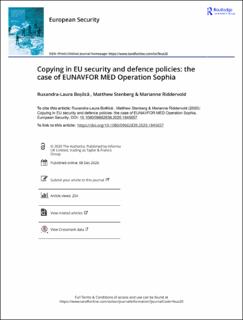| dc.contributor.author | Bosilca, Ruxandra-Laura | |
| dc.contributor.author | Stenberg, Matthew | |
| dc.contributor.author | Riddervold, Marianne | |
| dc.date.accessioned | 2021-07-02T15:03:28Z | |
| dc.date.available | 2021-07-02T15:03:28Z | |
| dc.date.created | 2020-12-16T15:48:59Z | |
| dc.date.issued | 2020 | |
| dc.identifier.citation | European Security. 2020, 30 (2), 218-236 | en_US |
| dc.identifier.issn | 0966-2839 | |
| dc.identifier.uri | https://hdl.handle.net/11250/2763143 | |
| dc.description.abstract | Why did the European Union (EU) launch a naval operation in response to the migration crisis, despite the humanitarian character of the challenge at hand, doubts about the effectiveness of a military response, and the EU’s traditional focus on civilian means? Integrating institutionalist theory and the literature on crisis response, this article argues that EUNAVFOR MED Operation Sophia is an example of copying through contingent learning wherein the EU’s response to the migration crisis was shaped by naval missions Operation Mare Nostrum and Operation Atalanta. While the former set a precedent for a naval response to migration in the Mediterranean, the latter provided an off-the-shelf institutional blueprint for the design and implementation of Operation Sophia. In a crisis situation characterised by high uncertainty, and with little time to rethink policies or to create new structures, EU political actors used contingent learning to quickly evaluate potential policy responses and institutional reforms, leading them to the decision to copy past institutional designs and practices previously considered successful. This finding has relevance beyond the case of Operation Sophia, as it contributes to a better understanding of why a particular type of policy or action is chosen in times of crisis and urgency. | en_US |
| dc.language.iso | eng | en_US |
| dc.rights | Attribution-NonCommercial-NoDerivatives 4.0 Internasjonal | * |
| dc.rights.uri | http://creativecommons.org/licenses/by-nc-nd/4.0/deed.no | * |
| dc.subject | European Union | en_US |
| dc.subject | EUNAVFOR MED Operation Sophia | en_US |
| dc.subject | institutionalism | en_US |
| dc.subject | copying | en_US |
| dc.subject | contingent learning | en_US |
| dc.title | Copying in EU security and defence policies: the case of EUNAVFOR MED Operation Sophia | en_US |
| dc.type | Peer reviewed | en_US |
| dc.type | Journal article | en_US |
| dc.description.version | publishedVersion | en_US |
| dc.subject.nsi | VDP::Samfunnsvitenskap: 200 | en_US |
| dc.source.pagenumber | 218-236 | en_US |
| dc.source.volume | 30 | en_US |
| dc.source.journal | European Security | en_US |
| dc.source.issue | 2 | en_US |
| dc.identifier.doi | 10.1080/09662839.2020.1845657 | |
| dc.identifier.cristin | 1860653 | |
| cristin.ispublished | true | |
| cristin.fulltext | original | |
| cristin.qualitycode | 1 | |

